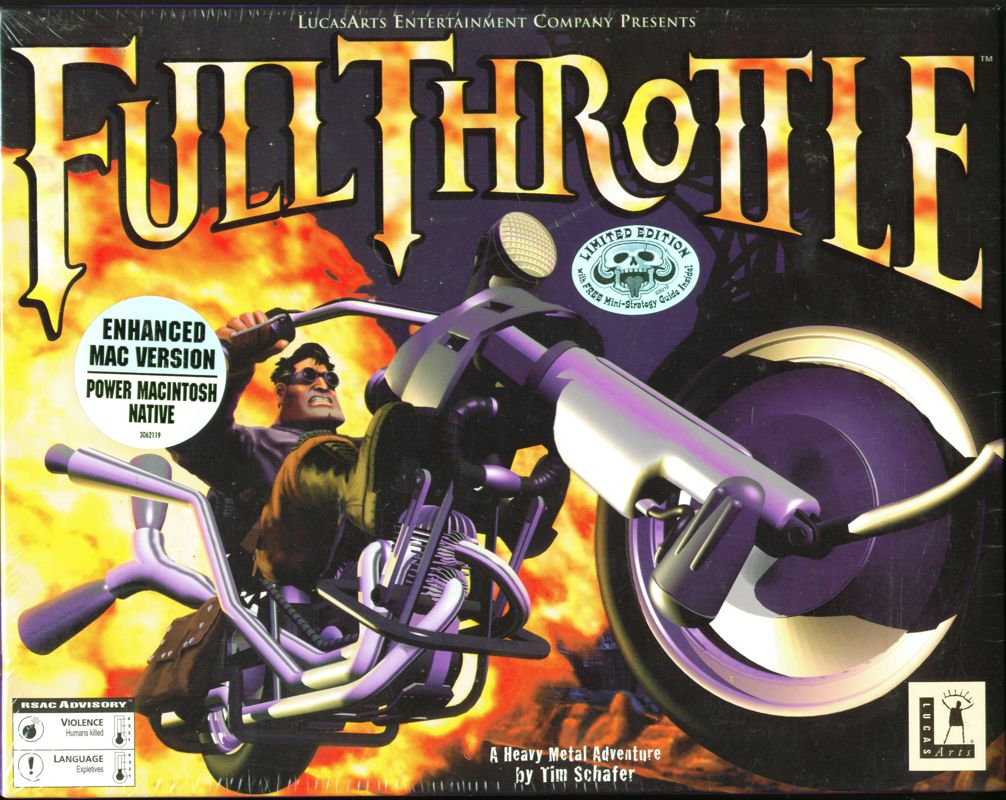

Title: |
|
Genre: |
|
|
Developer: |
|
|
Publisher: |
|
Release Date: |
|
On Wikipedia: |
|
Systems: |
|
I wrote this back in 2021 (note I was clearly bitter about something...) but never published it, wanting to play a few more LucasArts games before then, which I did.
Expanding upon the October 2020 review, I was trying to go through the "SCUMM canon", deciding upon Full Throttle, as was released around the same era of so many great titles (Maniac Mansion: Day of the Tentacle, Sam & Max Hit the Road, Monkey Island II), following the adventures of Ben, a motorcyclist, who finds himself in a mess when evil executive Adrian Ripburger sabotages his bike and frames him for murder. That's the gist of it anyway, it has many of the nicer features of LucasArts games from that era, including voice talent with people like Mark Hamill (the Ripburger voice is similar to his famous "Joker" voice, though not as growly or exaggerated) and Maurice LaMarche (using the same Orson Welles impression he does for everything, such as most famous role, the Brain from Pinky and the Brain).
Before reviving the page as "Exor's Dungeon", despite the dozens of game reviews I had written, none of the "LucasArts SCUMM canon" games I had played over the years actually made it into a review (Grim Fandango doesn't count, it uses an engine that was ultimately only used with two games), largely owing to the fact that the time I played them was a little bit BEFORE I first started writing reviews for the website.
My first knee-jerk reaction upon completing Full Throttle was that it was definitely one of the weakest entries of the LucasArts SCUMM canon that I'd played as of yet (I basically gave up on the "LucasArts games run" after Indiana Jones & The Last Crusade, which unexpectedly, like Sierra games, had several points where you could make the game unwinnable just by overlooking the most minor things). Full Throttle has very little puzzles, putting things together, or locations to explore—mostly there's a few short sequences and a long, somewhat annoying combat segment that glues the two parts together and as a result is extremely short. This may or may not have been due to development concerns, but unlike Grim Fandango I can't find anything about a bigger, grander plan tragically cut short.
One thing I do appreciate is that the world-building doesn't try to do what it's not. The game is set in a world where cars float but motorcycles don't, and has that gritty aesthetic that post-apocalyptic worlds tend to have, but creator Tim Schafer specifically denied that the game takes place after such an event, and despite my general dislike for him (also see my Psychonauts review), I do agree with that premise. It works because so many works have this supposedly-ruined world, yet there's still enough logistics working that beer could still be made and transported, there's enough food to feed the people still there, and so on (these things will take years to rebuild). Heck, the game has you infiltrating a stockholders' meeting in the third act. Mostly the world seems to be more desolate than anything else. Perhaps a sort of pandemic (a real one) that everyone just wanted to forget.
The cover here is taken from MobyGames, fair use in case anyone asks.
FINAL RATING: 